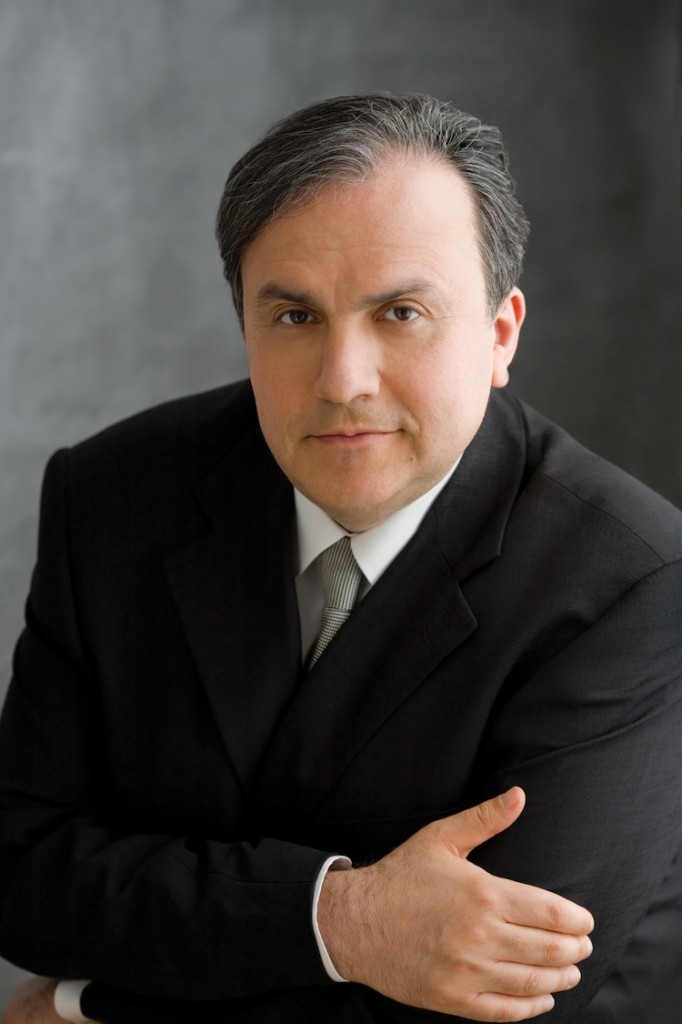Bronfman takes the lead in Philharmonic program

Yefim Bronfman performed Tchaikovsky’s Piano Concerto No. 1 with the New York Philharmonic to open the orchestra’s regular season. Photo: Dario Acosta
Following the gala concert Wednesday night, Alan Gilbert and the New York Philharmonic began their season proper Thursday with a concert of Ravel, Bernstein, and Tchaikovsky joined by the inimitable Yefim Bronfman.
Ravel’s fascination with Spain and its music goes back to his mother, who had grown up in Madrid of Basque descent. Spanish sounds abound in Ravel’s music, and in 1904-1905, he wrote a piano suite titled “Miroirs,” of which the fourth movement is Alborada del gracioso (Dawn Song of the Jester). Ravel then orchestrated this movement in 1918.
The opening pizzicato sounds meant to evoke a strumming guitar were delicate and buoyant yet crisp Thursday night, and there was a spaciousness and ease of tempo that seemed just right. The piece goes through many moods during its short span, and Gilbert led them through the different Spanish sound palettes deftly—at times ethereal and thin, and others dance-like and grandiose.
Leonard Bernstein’s beloved musical West Side Story came into the form we know it gradually, from beginnings in the late 1940‘s to the 1950’s, and finally opening on Broadway in 1957. West Side Story had in fact been mostly orchestrated by Sid Ramin and Irwin Kostal, with heavy editing and notes from Bernstein. In 1961, Bernstein assembled parts of the score into a symphonic suite.
Thursday night, the technical elements were all there, but none of the so-called Broadway magic. Gilbert started the orchestra off running, having barely reached the podium before cuing them in. The result was an opening that should have been exciting and breathless, but instead felt rushed and haphazard.
The “Somewhere” theme started off with a stunning viola solo, and as the strings came in, there was a richness of sound that begs to be savored, but the celebrated song just ended up feeling perfunctory. The “Mambo” is a thrilling ride, and the low strings—especially basses—kept the unbelievably fast passagework together. With the tight and grooving percussion section, the rousing Mambo flew by. In the Finale, as in “Somewhere”, Gilbert again seemed hesitant to lean into the lyric lushness, and the music went by in literal fashion, almost feeling routine.
The second half of the program marked the beginning of Yefim Bronfman’s season-long residency with the Philharmonic, which, among other events, will include performances of the complete Beethoven piano concertos. Thursday night, Bronfman was in top form playing Tchaikovsky’s Piano Concerto No. 1.
From the celebrated opening chords, Bronfman showed us that his playing has heft that never gives way to harshness. Bronfman moves easily between sections of impossibly fast octaves to delicate passagework. The piano solo that occurs in the first movement was especially striking, as the soloist voiced the melody between the two hands. In the third movement, Bronfman’s first theme was particularly dynamic with its biting accents.
One almost wishes the orchestra would have reciprocated more when it was their turn with the same theme. Bronfman long ago proved himself a sensitive collaborator, but Thursday, he also proved himself a strong-willed leader. The pianist had a way of leading the orchestra, especially in the third movement when the orchestra lagged behind his tempo.
Bronfman seemed to relay his energy and pacing to the orchestra, and the Philharmonic musicians responded with vigor, as evident in the lightning-quick scales that get traded between the pianist and orchestra in the final movement. The Philharmonic sounded energized in the Tchaikovsky in a way they hadn’t in the Bernstein, due in no small part to having such a masterful collaborator at the keyboard.
The program will be repeated 11 a.m. Friday, 8 p.m. Saturday, and 7:30 p.m. Tuesday. nyphil.org; 212-875-5656.



